- Home
- Naguib Mahfouz
Children of the Alley Page 23
Children of the Alley Read online
Page 23
He started to kiss her cheek and neck profusely, then tossed a lump of hashish in her lap.
“No one smokes this in our alley but the overseer and little old me!”
Sounds of a furious battle, of cursing, the blows of sticks crashing together and breaking glass sounded from the alley; then running footsteps, a woman’s shrieks and the barking of a dog. Worried curiosity lit up the woman’s eyes, but the man, oblivious, began to cut up the lump of hashish.
“It wasn’t easy, my coming here,” she said. “I go from the alley to Gamaliya, so no one will see me, and from Gamaliya to al-Darasa, and from al-Darasa to the desert, until I get to your back door.”
He bent over her, not interrupting the work of his hands, and smelled her armpit delightedly. “I have no problem visiting you in your house.”
“If you do, none of the cowards will give you any trouble.” She smiled. “Even Batikha will pat down the sand for you to walk on. Then they’ll work off their anger on me.” She toyed with his thick mustache and said playfully, “But you sneak out to this place for fear of your wife.”
He dropped the lump and encircled her with his arm, pulling her close so tightly that she moaned.
“God help us from the love of gangsters!” she whispered.
He released her as he lifted his head and threw out his chest like a rooster. “There is only one gangster. The rest are his children.”
She played with the chest hair that curled out of his shirt collar, and said, “Gangster over others but not over me.”
He tweaked her breasts lightly. “You are the crown on my head.” He reached behind the tray and grasped a jug. “Great stuff!”
“It has a strong odor my dear husband might smell,” she said regretfully.
He drank deeply from the jug until he had enough, and lined up the hashish, frowning. “Some kind of a husband he is! I’ve seen him so many times, wandering around like a lunatic—the first-ever male exorcist in this bizarre alley!”
“I owe him my life,” she said, watching him smoke. “That’s why I’m patient with him. There’s no harm in him, and it’s so easy to fool him.”
He offered her the pipe and she took the stem in her mouth eagerly and sucked at it avidly, exhaling the smoke with her eyes closed, her senses already stuporous. Then he took his turn smoking, drawing intermittent puffs and murmuring between each puff.
“Leave him…he’s wasting…your time…stupid…boy.”
She shrugged disparagingly. “My husband has nothing to do in this world but rid poor people of demons.”
“And you don’t rid him of anything?”
“Never, I swear! One look at his face and there’s nothing to be said.”
“Not even once a month?”
“Not even once a year—he’s distracted from his wife by other people’s demons!”
“So let the demons keep him! What good does it do him?”
She shook her head in confusion. “None. If it weren’t for his father we would have died of starvation by now. He thinks he’s obliged to please the poor people and save them.”
“And who obligated him?”
“He says this is what Gabalawi wants his children to do.”
Interest shone in the slits of Bayoumi’s eyes, and he set the pipe down on the tray. “He said that’s what Gabalawi wants?”
“Yes.”
“Who told him what Gabalawi wants?”
The woman felt anxious and annoyed—she was afraid of spoiling the mood or discussing something dangerous. “That’s how he interprets his sayings as the poets sing them.”
He began to finger a new lump of hashish. “What a bitch of an alley, and the Al Gabal are the worst part of it—they produce most of these quacks, and spread strange news about the estate and the Ten Conditions, as if Gabalawi were their ancestor alone. Yesterday their quack Gabal came with a lie and used it to steal the estate, and today this simpleton is interpreting things that cannot be interpreted. He’ll say that he heard them from Gabalawi himself.”
“All he claims to do is expel demons from poor people,” she said uneasily.
The gangster snorted contemptuously. “For all we know, the estate could have a demon!” He raised his voice to a pitch that did not suit the secrecy of their meeting. “Gabalawi is dead or as good as dead, you bastards!”
Yasmina was afraid of ruining the mood and missing this opportunity. She moved her hand to her dress and then slowly took it off. The man’s features softened after their sullenness, and he gazed at her with gleaming eyes.
56
The overseer looked tiny in his cloak. The worry was clear in his round white face, the exhaustion that depressed his eyelids, the premature old age in his eyes and the wrinkles worn under them by ardent lusts. Bayoumi’s fat face did not reflect the inner satisfaction he enjoyed at his master’s unease, unease that reflected the momentousness of the news he had brought him, and, by extension, the momentous role he fulfilled in the service of the overseer and the estate. He was speaking to the overseer. “I had to trouble you with this in spite of myself. I could not take action without consulting you in any matter having to do with the estate. On the other hand, this simpleminded troublemaker is from the Al Gabal, and we have an agreement whereby none of us may attack any of them except with your permission.”
Ihab, the overseer, asked gloomily, “Has he really claimed he spoke to Gabalawi?”
“I’ve heard it from more than one source. The people he treats believe it, even if they make a great secret of it.”
“Maybe he’s crazy, the same way Gabal was a quack, but this filthy alley loves madmen and quacks. What do the Al Gabal want now that they’ve plundered the estate, with no right to? Why doesn’t Gabalawi talk to someone besides them? Why doesn’t he come to me? I’m his closest relative. He’s confined in his room and the gate of his mansion is opened only when his possessions are brought to him. He sees no one and no one sees him except his slave girl, but how easy it is for the Al Gabal to meet him or hear from him!”
“They won’t be satisfied until the whole estate is theirs,” said Bayoumi hatefully.
The overseer’s face was pale with anger, and he jumped to his feet to give orders, but then changed his mind and asked, “Did he say anything about the estate, or did he confine his activities to expelling demons?”
“Like Gabal, who confined his activities to expelling snakes,” sneered Bayoumi, adding jeeringly, “What does Gabalawi have to do with demons?”
“I don’t want the same curse on me that did Effendi in,” said Ihab decisively as he stood up.
Bayoumi summoned Gaber, Handusa, Khalid and Batikha to his den and told them that it was up to them to cure the madness of Rifaa, the son of Shafi’i the carpenter.
“For this you summoned us here?” asked Batikha crossly.
Bayoumi nodded, and Batikha slapped his hands together in amazement. “Hah! The gangsters of the alley meet to talk about a creature that’s neither man nor woman!”
Bayoumi threw him a look of contempt. “He has pursued his activities before your very eyes and ears, and you sensed no danger. And of course you never heard any of his claims about hearing from Gabalawi.”
They exchanged fiery looks through the spreading smoke, and Batikha spoke in bafflement. “Son of a bitch! What’s this, Gabalawi and demons! Was our ancestor an exorcist?”
They started to laugh, but quickly desisted when they noticed Bayoumi’s terrible scowl. “Batikha, you are stoned,” he said. “Gangsters get drunk and smoke hashish, but sniffing cocaine is beneath them!”
“Sir,” said Batikha in self-defense, “at Antar’s wedding I was the target of twenty men’s clubs—my face and neck were covered with blood, but my own club never fell from my hands.”
“Let’s leave it to him to deal with as he chooses,” said Handusa urgently. “Otherwise he’ll lose his standing. I wish he could find some way besides attacking the simpleton. Attacking someone like that would only degrade us.�
��
The alley slept, its people unaware of what was being contrived in Bayoumi’s den. The next morning Rifaa left his house, and when he saw Batikha standing in his way, he greeted him. “Good morning, Batikha, sir.”
“A bad morning to you and your mother,” growled the man, throwing him a look of revulsion. “Get back in your house and don’t come out or I’ll break your head.”
“What has angered our protector?” asked Rifaa, surprised.
“You’re talking to Batikha now, not Gabalawi,” he stormed. “Just get going.”
Rifaa was about to speak, but the gangster slapped him so hard that he fell back against the wall of the house. A woman saw the incident and screamed until her voice filled the alley and other women imitated her. Cries to aid Rifaa rose into the air. In no time crowds ran to the scene, among them Zaki, Ali, Hussein and Karim; then came Shafi’i, and Gawad the poet, feeling his way with his cane, and before long the place was crowded with Rifaa’s followers, both men and women. Batikha, who had expected none of this, was surprised, but lifted his hand and brought it down on Rifaa’s face. He took the blow without defending himself, but the crowd shouted in confusion, for they were seized with an intense agitation; some of them pleaded with Batikha to leave him alone, while others enumerated Rifaa’s virtues and good deeds. Many of them asked why he had been attacked, and they protested loudly.
Batikha’s anger flared up. “Have you forgotten who I am?”
The truth is that the crowd’s love for Rifaa, which had moved them to congregate unconsciously, was what emboldened them to respond to Batikha’s warning.
“Our protector, the crown on our head,” said a man in the front row of the crowd, “we have come only to ask your pardon for this good man.”
“You are our protector and we obey you,” shouted a man from the middle of the demonstration, emboldened by the size of the crowd and his location in it. “But what has Rifaa done?”
“Rifaa is innocent, and woe to anyone who harms him!” shouted a third man, at the rear of the crowd, reassured that he was invisible to the gangster’s eyes.
Batikha’s fury shot up, and he raised his club over his head. “You women!” he bellowed. “I’ll teach you a lesson!”
The women’s voices sounded from all corners until the alley was convulsed with screams, and every angry throat hurled bloody threats. Bricks landed at Batikha’s feet, barring him from taking a step. The man found himself in a terrible spot such as he had never experienced, not even in a nightmare. Death would be easier than asking any of the other gangsters for help, and the downpour of bricks was threatening him with death. He showed his leadership by his silence, and sparks flew from his eyes as the bricks continued to fly and the crowd still menaced him. Nothing like this had ever happened to any of the gangsters before.
Abruptly Rifaa went over to stand before Batikha, and held up his hands to the people until silence fell.
“Batikha has done nothing wrong,” he called in a powerful voice. “I am to blame!”
Their faces showed their skepticism but no one uttered a word.
“Go home before he gets angry with you.”
Most of the people understood that he wanted to spare the gangster’s honor and thus end the crisis, so they dispersed, followed by others who were merely confused. The rest sped away out of fear of being alone with Batikha, and the neighborhood was left empty.
57
Tension in the alley rose after the incident. What frightened the overseer more than anything was the thought that the alley would assume that their solidarity gave them the power to resist gangsters. So it was imperative—in his view—to get rid of Rifaa as well as those who stood by him, though this could only happen with the collusion of Khunfis, the protector of the Al Gabal, in order to avoid the outbreak of open warfare in the alley. The overseer told Bayoumi, “Rifaa is not as weak as you think. He has followers who were able to save him in spite of the gangster. What would happen if the whole alley followed him the way his neighborhood does? He’ll put his demons aside and announce that the estate is his real aim!” Bayoumi shook Batikha violently by the shoulders and spewed his wrath out at him. “We gave this business to you alone, and what did you do! You’re a disgrace to all of us!” Batikha ground his teeth angrily and said, “I’ll get rid of him for you, even if I have to kill him,” and Bayoumi shouted, “The best thing for you to do is to vanish from this alley forever!” He sent a messenger to Khunfis summoning him to a meeting, but Shafi’i blocked Khunfis’ way. He was more frightened than he had ever been in his life. He had tried to persuade his son to go back to the shop and abandon the work which had brought him so much hardship, but he failed in his effort and went back disappointed. When he heard that Khunfis had been summoned to meet Bayoumi, he blocked his path and told him, “Khunfis, sir, you are our protector and defender. They are asking for you to turn Rifaa over to them, but don’t turn him in. Promise them what they want, but don’t turn him in. Just give me the order and I’ll leave the alley and take him with me, by force if necessary. Just don’t turn him in!” Khunfis said very cautiously, “I know better than anyone what to do, and where the Al Gabal’s interests lie.” The truth is that Khunfis had been deeply worried for Rifaa’s sake ever since hearing of the incident with Batikha, and thought that it was he himself, not the overseer or Bayoumi, who should be wary.
So he went to Bayoumi’s house and met with him in the reception hall. The gangster told him freely that he had called him there in his capacity as the protector of the Al Gabal so that they might have a meeting of the minds about Rifaa.
“Don’t take him lightly,” Bayoumi said. “These incidents prove how strong his influence is.”
Khunfis agreed, but pleaded that “no one should attack him in front of me.”
“We are men, and our interests are the same,” said Bayoumi. “We attack no one in our own houses. This boy is coming now, so that I may examine him in your hearing.”
And Rifaa came. With his radiant face, he greeted the two men and sat where Bayoumi indicated, on a cushion before them. Bayoumi stared searchingly into his calm, beautiful face, marveling at how this meek child had become the source of these dreadful convulsions.
“Why did you leave your neighborhood and your people?” he asked Rifaa coarsely.
“None of them paid any attention to me,” Rifaa said simply.
“What did you want from them?”
“To cleanse them of the demons that corrupted their happiness.”
“And are you responsible for the people’s happiness?” asked Bayoumi, his voice distorted with rage.
“Yes, for as long as I can achieve it,” said Rifaa with frank innocence.
“They have heard you expressing disdain for majesty and power.” Bayoumi scowled.
“In order to prove to them that happiness is not in their delusions but in what I do.”
“Doesn’t that express contempt for those who possess majesty and power?” asked Khunfis angrily.
“No, sir,” he replied, untroubled by the man’s anger. “But it does express a warning that happiness is something else, other than power and majesty.”
Bayoumi studied him with a penetrating gaze. “They have heard you say that this is what Gabalawi wants for them.”
Concern showed in Rifaa’s limpid eyes. “They say that!”
“What do you say?”
For the first time, he hesitated. “I speak as much as I understand.”
“Atrocities come from such stupidity,” sneered Khunfis.
“But they say that you repeat to them what you heard from Gabalawi himself!” said Bayoumi, narrowing his eyes.
Confusion appeared in his eyes and he hesitated for a second time before answering. “That is how I understood what he told Adham and Gabal!”
“What he told Gabal does not need interpreting!” screeched Khunfis furiously.
Bayoumi’s malice intensified, and he thought to himself, You are all liars, and Gabal was the
first liar among you, you thieves.
“You say that you heard Gabalawi,” he said, “and you said, ‘This is what Gabalawi wants.’ No one may speak in Gabalawi’s name except the overseer of his estate and his heir. If Gabalawi wanted to say anything he would have said it to him. He is in charge of his estate and the executor of its Ten Conditions. You simpleton, how can you despise power, majesty and wealth in the name of Gabalawi when these are his own attributes?”
Rifaa’s gentle features disclosed his pain. “I speak to the people of our alley, not to Gabalawi. They are the ones afflicted by demons. They are the ones tortured by problems.”
“What are you but simply someone incapable of power and majesty,” Bayoumi shouted at him. “That’s why you curse them—and to raise your pathetic rank among the stupid people of our alley above the rank of people with prestige, and when they follow you, you use them to steal power and majesty!”
Rifaa’s eyes widened in surprise. “My only aim is the happiness of the people of our alley.”
“You sly little son of a bitch! You delude people into thinking they’re sick, that we’re all sick, that no one is sane in this alley but you!”
“Why do you despise happiness when you are so close to having it?”
“You sly little son of a bitch! Happiness coming from someone like you is cursed!”
“Why do people hate me,” sighed Rifaa, “when I have never hated anyone?”
“You don’t fool us the way you fool those stupid people,” Bayoumi shouted at him. “Forget your lies and understand that I may not be disobeyed. Thank God that you are in my house; otherwise you might not be leaving here so healthy.”
Rifaa stood despairingly, took his leave and went out.
“Leave him to me,” said Khunfis.
“The fool has many followers,” Bayoumi cautioned him. “We don’t want a massacre.”
58
After leaving Bayoumi’s house, Rifaa headed for his own house. The skies were swathed in autumn mist, and a mild breeze was in the air. The whole alley was crowded around the lemon stalls; it was pickling season, and there was a roar of storytelling and laughter. Some boys had got into a fight and were pelting each other with dirt. Several people greeted Rifaa, but he was also spattered with dirt, so he went on to his house, dusting off his shoulders and his turban. He found Zaki, Ali, Hussein and Karim waiting for him, and they embraced as they did whenever they met, and he told them—and his wife, who joined them—what had gone on between him and Bayoumi and Khunfis. They listened carefully and worriedly, and by the time he finished his story all their faces were grim. Yasmina asked herself: So what would be the outcome of this trying situation? Was there a solution that would save this good man from ruin without threatening her happiness? All their eyes were curious. Rifaa rested his head somewhat wearily against the wall.

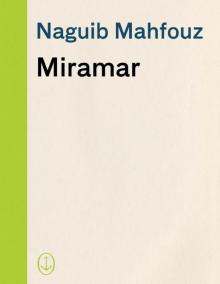 Miramar
Miramar The Mummy Awakens
The Mummy Awakens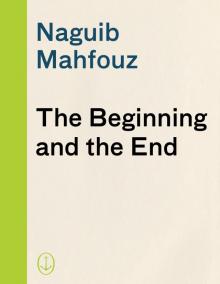 The Beginning and the End
The Beginning and the End Respected Sir, Wedding Song, the Search
Respected Sir, Wedding Song, the Search The Mirage
The Mirage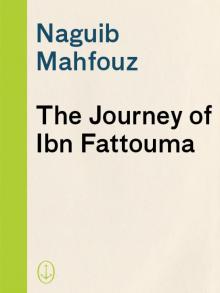 Novels by Naguib Mahfouz
Novels by Naguib Mahfouz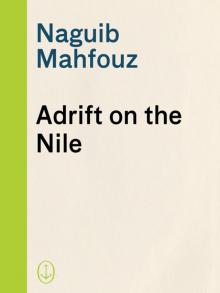 Adrift on the Nile
Adrift on the Nile Karnak Café
Karnak Café Heart of the Night
Heart of the Night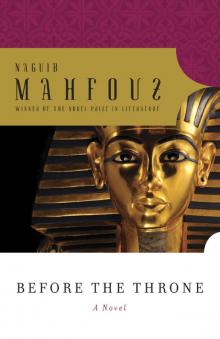 Before the Throne
Before the Throne The Time and the Place: And Other Stories
The Time and the Place: And Other Stories Cairo Modern
Cairo Modern Arabian Nights and Days
Arabian Nights and Days The Day the Leader Was Killed
The Day the Leader Was Killed Morning and Evening Talk
Morning and Evening Talk Three Novels of Ancient Egypt Khufu's Wisdom
Three Novels of Ancient Egypt Khufu's Wisdom Akhenaten: Dweller in Truth
Akhenaten: Dweller in Truth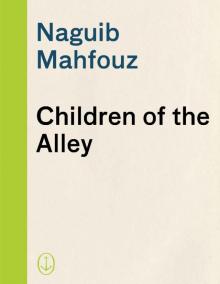 Children of the Alley
Children of the Alley Voices From the Other World
Voices From the Other World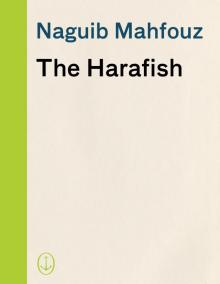 The Harafish
The Harafish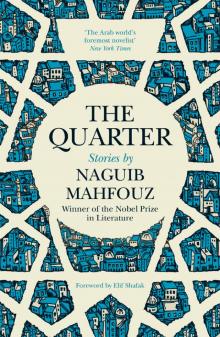 The Quarter
The Quarter The Seventh Heaven: Supernatural Tales
The Seventh Heaven: Supernatural Tales The Cairo Trilogy: Palace Walk, Palace of Desire, Sugar Street
The Cairo Trilogy: Palace Walk, Palace of Desire, Sugar Street Khan Al-Khalili
Khan Al-Khalili Three Novels of Ancient Egypt Khufu's Wisdom, Rhadopis of Nubia, Thebes at War
Three Novels of Ancient Egypt Khufu's Wisdom, Rhadopis of Nubia, Thebes at War Three Novels of Ancient Egypt
Three Novels of Ancient Egypt The Time and the Place
The Time and the Place Palace Walk tct-1
Palace Walk tct-1 Akhenaten
Akhenaten The Seventh Heaven
The Seventh Heaven The Thief and the Dogs
The Thief and the Dogs The Cairo Trilogy
The Cairo Trilogy Sugar Street tct-3
Sugar Street tct-3 Palace of Desire tct-2
Palace of Desire tct-2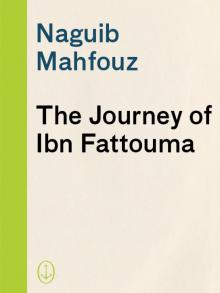 The Journey of Ibn Fattouma
The Journey of Ibn Fattouma